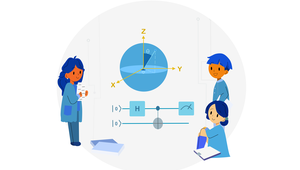Welcome to Quantum Mechanics I
- Duration: 3 hours
- Effort: 15 hours
- Pace: Self paced
- Lessons: 11
- Activities: 20
What you will learn
At the end of this course, you will be able to:
Know about
- Quantum description of qubits
- Kets and bras formalism
- Operators and measurements
- Born rule
- Bi-partite entanglement
- Bell’s inequality
Description
This course is for people who are new to Quantum Information and Computing, such as students, engineers, developers, etc., and would like to develop a good basic understanding of the concepts and tools used in Quantum Mechanics.
The course introduces the primary concepts of quantum physics (probabilistic nature) and the basic tools of quantum kinematics that are used to describe quantum systems.
Continued by the course Welcome to Quantum Mechanics II.
Format
11 short lectures, each lecture consists of one to three parts of videos, tutorial excercises and additional video materials.
Prerequisites
High School Math, Basic algebra.
Course plan
- 1.1 Photon polarization and detection
- 1.2 Hidden variable model for single-photon source
- 1.3 Bell’s inequality: No hidden determinism
• Hidden variable model for photon pairs and Bell’s inequality
• Violation of Bell’s inequality
- 2.1 Polarization qubit (vertical and horizontal)
- 2.2 Simple operations on polarization qubits
• Single operations
• Successive operations
- 3.1 Alternative descriptions of polarization qubits
• Diagonal and anti-diagonal polarizations
• Right-circular and left-circular polarizations - 3.2 Measurements and Pauli matrices
- 4.1 The alternative descriptions are equally good
- 4.2 Generic polarization
• Polarization kets
• Pairs of basis kets
• Columns of amplitudes
- 5.1 Bras as partners of kets
• Adjoint of a ket is a bra
• Bras are represented by rows - 5.2 Bra-ket products
• Amplitudes as bra-ket products
• Inner products of kets
• Inner products of bras
- 6.1 More Bra-ket products
• Length and normalization
• Orthogonality - 6.2 Identity
• Ket-bra representations
• Completeness relations for polarization qubits
- 7.1 Operators are sums of ket-bras
• Ket-bras in the vertical and horizontal basis
• Pauli operators - 7.2 Pauli operators in alternative representations
- 8.1 Photon polarization qubit
• Probability amplitudes and probabilities for photon polarizations
• Born rule for photon polarization - 8.2 From polarization qubits to general qubits
- 9.1 Orthonormality and completeness relation
- 9.2 Unitary operators and basis transformations
- 9.3 Born rule and the symmetry of the probabilities
- 10.1 Description of two-qubit systems
- 10.2 Entangled states
- 11.1 Measurement settings
- 11.2 Maximum violation of Bells inequality
This course is part of a program
Course team
Prof. Berge Englert
Dr. Dai Jibo
Organizations



License
License for the course content
What is the license for the course content?
License for the content created by course participants
What is the license for the content created by course participants?



